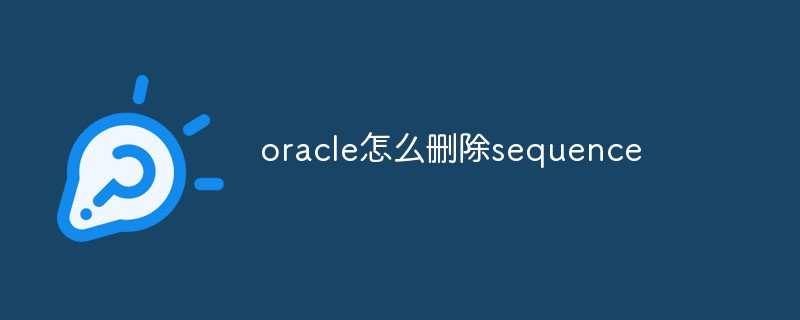In Oracle, table partitioning refers to physically storing the data in the table into multiple table spaces when the data in the table continues to increase, that is, partitioning the table; table partitioning can Tables, indexes, or index-organized tables are further subdivided into segments. Segments of these database objects are called partitions, which improve manageability, performance, and availability.

The operating environment of this tutorial: Windows 10 system, Oracle 11g version, Dell G3 computer.
What is Oracle table partitioning
Partitioned table: When the amount of data in the table continues to increase, the speed of querying data will slow down, and the performance of the application will decrease. At this time, You should consider partitioning the table.
After the table is partitioned, the logical table is still a complete table, but the data in the table is physically stored in multiple table spaces (physical files), so that when querying the data, it will not Scan the entire table every time.
The specific role of table partitioning
Oracle’s table partitioning function brings great benefits to various applications by improving manageability, performance and availability. benefit. In general, partitioning can greatly improve the performance of certain queries and maintenance operations. In addition, partitioning can greatly simplify common management tasks and is a key tool in building gigabyte data systems or ultra-high availability systems.
The partitioning function can further subdivide tables, indexes or index-organized tables into segments. The segments of these database objects are called partitions. Each partition has its own name and can select its own storage characteristics. From the perspective of a database administrator, a partitioned object has multiple segments, and these segments can be managed collectively or individually. This gives the database administrator considerable flexibility when managing partitioned objects. sex. However, from an application perspective, a partitioned table is identical to a non-partitioned table, and no modification is required when accessing a partitioned table using SQL DML commands.
When to use a partition table, the official advice is:
a. The size of the table exceeds 2GB.
b. The table contains historical data, and new data is added to the new partition.
Advantages and disadvantages of table partitioning
Advantages:
a. Improve query performance: Yes When querying partition objects, you can only search the partitions you care about to improve retrieval speed.
b. Enhanced availability: If a partition of the table fails, the data in other partitions of the table is still available.
c. Easy maintenance: If a partition of the table fails and the data needs to be repaired, only the partition can be repaired.
d. Balanced I/O: Different partitions can be mapped to disks to balance I/O and improve overall system performance.
Disadvantages:
Related to partition tables, there is no way to directly convert existing tables into partition tables. However, Oracle provides the function of online redefinition of tables.
Several types and operation methods of table partitions
1 Range partition (range) maxvalue
Range partition maps data to each location based on the range Partition, this range is determined by the partition key you specify when creating the partition. This partitioning method is the most commonly used, and the partition key often uses a date. For example: you might partition your sales data by month.
When using range partitioning, please consider the following rules:
a. Each partition must have a VALUES LESS THEN clause, which specifies a value that is not included in the partition. upper limit value. Any records with a partition key value equal to or greater than this upper limit will be added to the next higher partition.
b. All partitions, except the first one, will have an implicit lower limit value. This value is the upper limit value of the previous partition of this partition.
c. If the range of some records cannot be predicted yet, you can create a maxvalue partition. All records that are not within the specified range will be stored in the partition where maxvalue is located.
Example 1: Suppose there is a test table with 200,000 rows of data. We partition this table by id. Each partition stores 100,000 rows. We save each partition to a separate table space. , so that the data files can span multiple physical disks. The following is the code to create tables and partitions, as follows:
----Create multiple test table spaces first
sys@ORCL>create tablespace test_ts01 datafile '/home/oracle/test_01.dbf' size 32m extent management local autoallocate; Tablespace created. sys@ORCL>create tablespace test_ts02 datafile '/home/oracle/test_02.dbf' size 32m extent management local autoallocate; Tablespace created. sys@ORCL>create tablespace test_ts03 datafile '/home/oracle/test_03.dbf' size 32m extent management local autoallocate; Tablespace created.
----Create test partition table
create table test
( id number not null,
first_name varchar2(30) not null,
last_name varchar2(30) not null,
phone varchar2(30) not null,
email varchar2(80),
status char(1),
constraint test_id primary key (id)
)
partition by range (id)
( partition test_part1 values less than (100000) tablespace test_ts01,
partition test_part2 values less than (200000) tablespace test_ts02,
partition test_part3 values less than (maxvalue) tablespace test_ts03
); Recommended tutorial: "Oracle Video Tutorial"
The above is the detailed content of What is oracle table partitioning. For more information, please follow other related articles on the PHP Chinese website!
 oracle怎么查询所有索引May 13, 2022 pm 05:23 PM
oracle怎么查询所有索引May 13, 2022 pm 05:23 PM方法:1、利用“select*from user_indexes where table_name=表名”语句查询表中索引;2、利用“select*from all_indexes where table_name=表名”语句查询所有索引。
 什么是oracle asmApr 18, 2022 pm 04:16 PM
什么是oracle asmApr 18, 2022 pm 04:16 PMoracle asm指的是“自动存储管理”,是一种卷管理器,可自动管理磁盘组并提供有效的数据冗余功能;它是做为单独的Oracle实例实施和部署。asm的优势:1、配置简单、可最大化推动数据库合并的存储资源利用;2、支持BIGFILE文件等。
 Oracle怎么查询端口号May 13, 2022 am 10:10 AM
Oracle怎么查询端口号May 13, 2022 am 10:10 AM在Oracle中,可利用lsnrctl命令查询端口号,该命令是Oracle的监听命令;在启动、关闭或重启oracle监听器之前可使用该命令检查oracle监听器的状态,语法为“lsnrctl status”,结果PORT后的内容就是端口号。
 oracle全角怎么转半角May 13, 2022 pm 03:21 PM
oracle全角怎么转半角May 13, 2022 pm 03:21 PM在oracle中,可以利用“TO_SINGLE_BYTE(String)”将全角转换为半角;“TO_SINGLE_BYTE”函数可以将参数中所有多字节字符都替换为等价的单字节字符,只有当数据库字符集同时包含多字节和单字节字符的时候有效。
 oracle查询怎么不区分大小写May 10, 2022 pm 05:45 PM
oracle查询怎么不区分大小写May 10, 2022 pm 05:45 PM方法:1、利用“LOWER(字段值)”将字段转为小写,或者利用“UPPER(字段值)”将字段转为大写;2、利用“REGEXP_LIKE(字符串,正则表达式,'i')”,当参数设置为“i”时,说明进行匹配不区分大小写。
 oracle怎么删除sequenceMay 13, 2022 pm 03:35 PM
oracle怎么删除sequenceMay 13, 2022 pm 03:35 PM在oracle中,可以利用“drop sequence sequence名”来删除sequence;sequence是自动增加数字序列的意思,也就是序列号,序列号自动增加不能重置,因此需要利用drop sequence语句来删除序列。
 oracle怎么查询数据类型May 13, 2022 pm 04:19 PM
oracle怎么查询数据类型May 13, 2022 pm 04:19 PM在oracle中,可以利用“select ... From all_tab_columns where table_name=upper('表名') AND owner=upper('数据库登录用户名');”语句查询数据库表的数据类型。
 Oracle怎么修改sessionMay 13, 2022 pm 05:06 PM
Oracle怎么修改sessionMay 13, 2022 pm 05:06 PM方法:1、利用“alter system set sessions=修改后的数值 scope=spfile”语句修改session参数;2、修改参数之后利用“shutdown immediate – startup”语句重启服务器即可生效。


Hot AI Tools

Undresser.AI Undress
AI-powered app for creating realistic nude photos

AI Clothes Remover
Online AI tool for removing clothes from photos.

Undress AI Tool
Undress images for free

Clothoff.io
AI clothes remover

AI Hentai Generator
Generate AI Hentai for free.

Hot Article

Hot Tools

ZendStudio 13.5.1 Mac
Powerful PHP integrated development environment

Safe Exam Browser
Safe Exam Browser is a secure browser environment for taking online exams securely. This software turns any computer into a secure workstation. It controls access to any utility and prevents students from using unauthorized resources.

SAP NetWeaver Server Adapter for Eclipse
Integrate Eclipse with SAP NetWeaver application server.

WebStorm Mac version
Useful JavaScript development tools

Atom editor mac version download
The most popular open source editor






